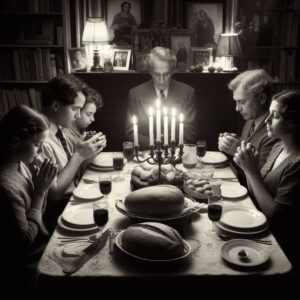Understanding Faith in the Modern World

With the advent of science and technology presenting alternative explanations to phenomena once attributed to the divine, and the rise of individualism putting personal freedom at the forefront, the traditional collective narratives that faith traditions provide are being challenged.
Faith traditions today face the task of interpreting and practicing their creeds within the complexities of multicultural, pluralistic societies. Faith becomes a personal compass and part of a larger dialectic of cultural identities and worldviews. In these pluralistic settings, faith can be both a bridge and a barrier—cultivating a rich tapestry of interfaith dialogue and understanding, while also posing challenges to inclusivity and universal ethics.
The fast pace of modern life often leaves little room for quiet reflection or the loneliness that can deepen spiritual understanding. The commodification of time has meant that moments for meditation, prayer, and spiritual practices must compete with work, entertainment, and an overwhelming plethora of distractions. This competition for time can lead to a ritualistic rather than a substantive engagement with faith, with individuals struggling to find the depth of spirituality that extends beyond obligatory practices.
This struggle is also the soil from which new forms of spiritual expression and practice can emerge. By recognizing the challenges facing faith in the modern world, proponents of religious traditions are presented with the opportunity to innovate—to find ways in which spirituality can be made more accessible and integrated into the daily lives of the faithful. It is the realization that faith need not be a relic of a bygone era but can evolve to become a living, breathing element of daily existence that harmonizes with the external modernity without losing its inner sanctity.
The contemporary believer is tasked with navigating a complex landscape, one where faith must be both a mooring and a sail—offering grounding in traditions while moving forward with the currents of change.Faith can offer unique perspectives on modern dilemmas, extending its relevance and enriching the tapestry of modern life with transcendent threads that remind us of the enduring pursuit of meaning and spirituality.
The Importance of Rituals and Daily Practices
The commitment to regular spiritual practices can ripple outward, influencing all facets of one’s existence. These small, intentional actions become sacred rituals that open the mind to a larger perspective and the heart to a deeper sense of compassion and understanding. Rituals are fluid and adaptable to individual lifestyles and needs.
Such daily practices have been found to bolster emotional health and provide a framework for facing life’s challenges. In moments of uncertainty or distress, the familiarity of a ritual can be a source of comfort and stability. The act of lighting a candle, the reciting of a cherished passage, or even the methodical counting of beads on a rosary can serve as a life raft in stormy seas, a reminder that there is a presence larger than life’s turbulent events.
The importance of these rituals extends into the nuanced arena of the psychological. According to research on the psychology of habits, the structure provided by daily rituals can enhance our sense of control and predictability, contributing to an overall sense of psychological well-being. When these habits are tied to faith and spirituality, they also tap into the profound human need for connection to something greater than oneself—a quest for meaning that transcends the immediate gratifications of the material world.
Faith in Decision Making
Bringing faith into the decision-making fold does not confine an individual to rigid, prescribed choices,it enables them to draw upon a rich reservoir of wisdom that has been refined through generations. This wisdom, often encapsulated in religious texts, traditions, and communal knowledge, acts as a beacon when navigating the murky waters of moral uncertainty. In the workplace, for example, ethical judgments may involve issues like integrity, fairness, and honesty. A person of faith might reflect upon the golden rule common to many religious traditions—”Do unto others as you would have them do unto you”—when making decisions that affect colleagues and the broader business environment.
When it comes to personal and family life, faith can be particularly influential in decisions on how to nurture relationships, parent effectively, or manage household finances. Parents might look to their faith to cultivate virtues such as patience and forgiveness within their family dynamics, aspiring to create an environment where all members grow and flourish. In financial decisions, the principles of charity and stewardship often advocated in faith traditions may guide individuals to make thoughtful choices about spending, saving, and giving, with a view towards the welfare of others.
Navigating the complexities of modern life, however, requires a nuanced application of faith-informed decision-making. It means considering the diversity and plurality of our societies and the manifold perspectives that come from different life experiences and beliefs. In many instances, faith must engage in dialogue with secular knowledge, such as scientific understanding, socioeconomic insights, and cultural awareness. This dialogue enriches faith, preventing it from becoming insular or disconnected from the world it seeks to serve.
